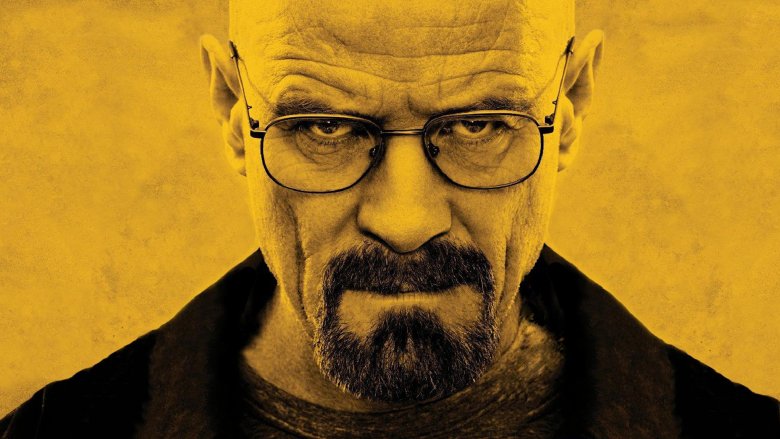Did The Breaking Bad Finale Give Walt What He Deserved?
Breaking Bad is one of the greatest television shows of all time, and its main character — Bryan Cranston's high school chemistry teacher turned cold-blooded meth kingpin Walter White — is among the most indelible in the medium's history. The series was a result of the desire of creator Vince Gilligan to see if he could, over the course of a series' run, transform its protagonist into its antagonist while still keeping the audience on board — or, as he said in describing his initial pitch for the series, to tell the story of a man who "transforms himself from Mr. Chips to Scarface."
White, whose alter-ego "Heisenberg" came to cause the Albuquerque criminal underworld to tremble at the mere mention of his name, is a fascinatingly complex character: a family man willing to rip other peoples' families apart to serve his ends, an expert chemist whose mastery of his craft led him to unleash poison on the New Mexico streets, a cancer survivor whose supposed goal of collecting a truckload of cash for his family after his demise continued to grow even after the cancer has receded.
In Breaking Bad's final episode, Felina (an anagram for "finale"), White died after an impressive tear of tying up loose ends; he put his ex-business partners Gretchen and Elliott Schwartz, whom he felt had cheated him out a rightful stake in their company Grey Matter, in their places, forcing them to assist in funneling his money to his family under the (false) threat of death; he achieved a semblance of closure with his wife, Skyler, admitting that at some point his meth-manufacturing endeavors had become all about him; and he freed his former partner in crime Jesse Pinkman from forced, meth-cooking servitude at the hands of a Nazi gang, a fate White himself had consigned the young man to.
He also died content, sacrificing himself to save Jesse from the hail of bullets which his improvised machine gun contraption had rained down upon the Nazis. As Jesse fled and the cops approached, he got a moment to lovingly walk among the tanks of a drug manufacturing setup inspired heavily by his own work, and he slipped peacefully away before he could ever be confronted by the long arm of the law over his activities as Heisenberg.
Was this the ending that Walter White deserved?
Well, this obviously depends in large part upon your opinion of what exactly White deserved. Gilligan admirably achieved his goal of transforming the character from a sympathetic one to be related to, to a highly morally ambiguous, unpredictable one to be feared — yet, throughout the series' five seasons, White rarely takes an action that doesn't make some kind of sense at the time. Even in the instance which seemed to fully mark the completion of his shift from villain to hero — his decision not to save Jesse's girlfriend Jane (Krysten Ritter) as she died in front of him of a drug overdose — it could be argued that, aside from his own self-serving motive of not wanting to lose Jesse as a partner, he was also invested in saving the young man from the consequences of the heroin habit which he and Jane had fallen into.
But White was also a man possessed of a towering ego, one which reliably upended any small measure of stability he managed to luck his way into. Despite the promise of ridiculous amounts of money in his employ, he continually antagonized — and, eventually, participated in the murder of — restaurant magnate and drug lord Gus Fring; he abandoned the opportunity for a titanic final score in favor of continuing to build his meth empire; he fled to New Hampshire to save his own skin, leaving the family that he had ostensibly built that empire for high and dry.
By the time "Felina" rolled around, White had utterly cemented his status as a ruthless monster — and then, in that closing episode, he seemed to abruptly change course. He had to have known that returning to New Mexico would spell his doom, but return he did — and before setting up the meeting with the Nazis which could never have been anything but his last stand, he made certain that his family would never want for anything. Also, during the course of that meeting, he ensured that former partner Todd (Jesse Plemons) — whose wanton murder of a child set in motion the events that would lead to White's flight from New Mexico — was punished for his action, and that Jesse would once again be a free man.
In fact, some have opined that "Felina" wrapped up things a little too nicely for White, with many even going so far as to speculate that such a perfect series of circumstances must have played out all in his head, perhaps as he lay dying in that chilly cabin in New Hampshire. But, of course, we now know this not to be the case — unless the events of the upcoming El Camino: A Breaking Bad Movie, which chronicles the story of Jesse's flight from the law after the finale's events, are all in White's head, too.
In the end, Walter White got everything he wanted: his family in possession of his ill-gotten gains, Jesse freed, Todd and the Nazis dead, and his legacy as Heisenberg — the most feared drug lord in New Mexico history, creator of the purest formula for crystal methamphetamine that had ever been devised — forever secure.
Throughout Breaking Bad's run, Walter White lied, schemed, and killed, and death is surely what he deserved. But what he got was death on his own terms, by his own design — and whether or not he deserved that is a compelling and open question.
El Camino: A Breaking Bad Movie premieres on Netflix on October 11.
